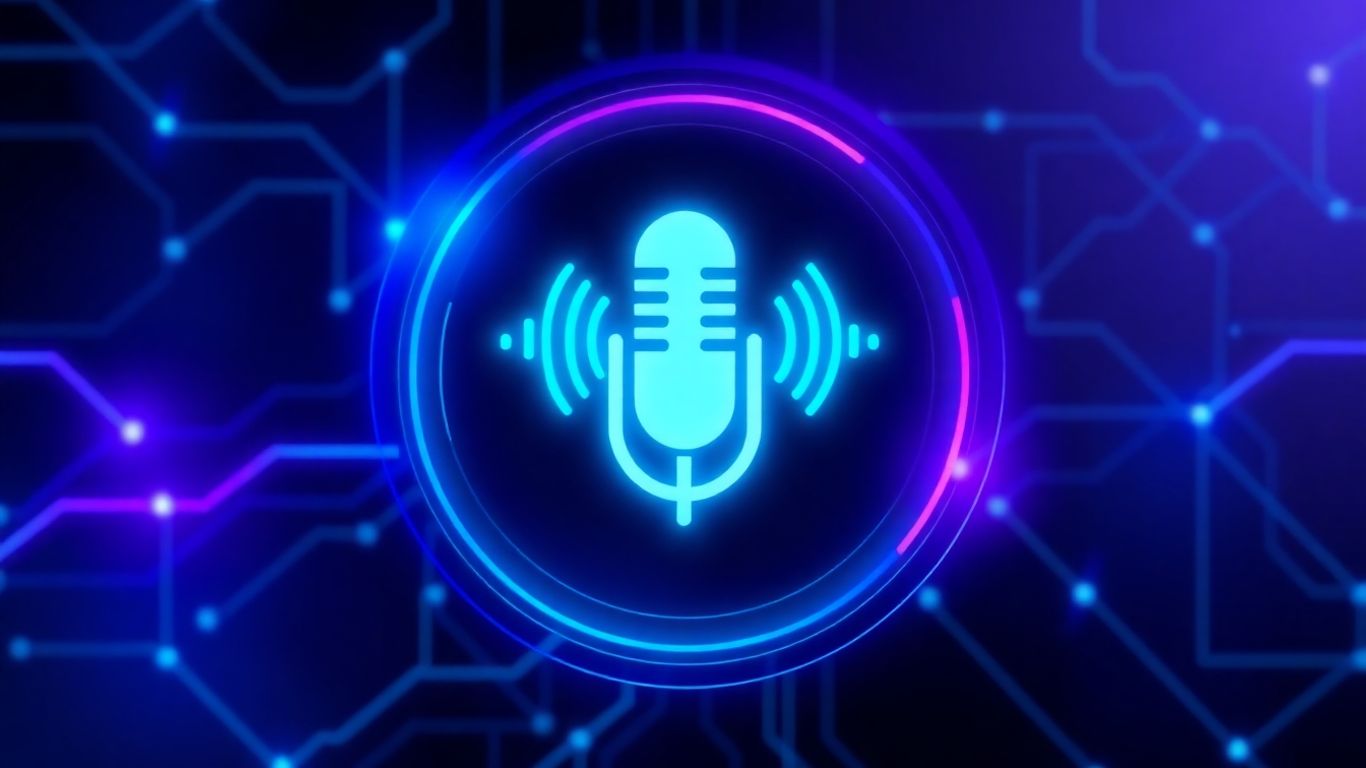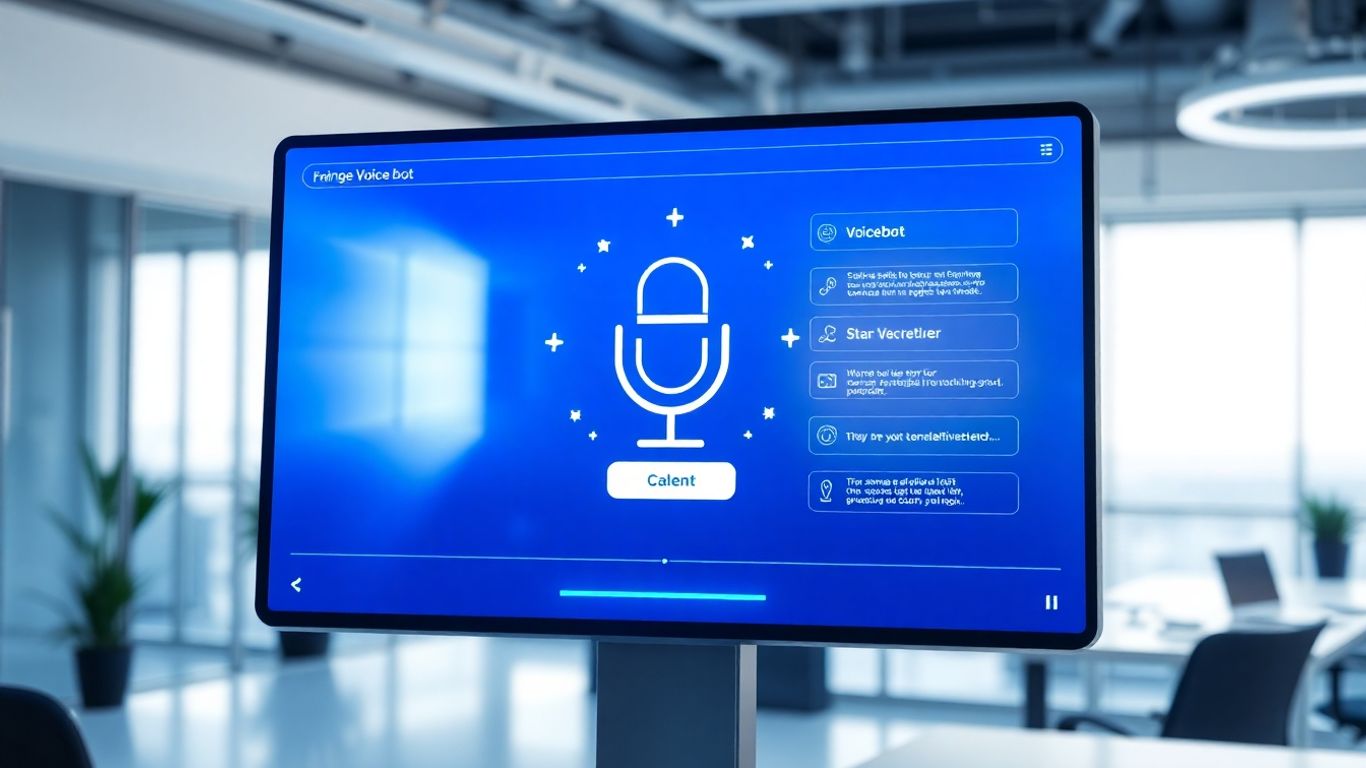Looking to upgrade your customer service game for 2025? You're in the right place. Voicebots are changing how businesses talk to their customers, making things faster and smoother. Forget those old, clunky phone systems. We're talking about smart AI that can actually understand and help people. This article dives into the top 5 best voicebot for AI contact centers that are making waves right now. Let's see how they can help your business.

When you're looking at AI voice solutions for your contact center, QCall.ai really stands out. What makes it different is how natural the conversations feel. They've managed to get their voice quality to about 97% human-like, which is pretty impressive. This means customers are less likely to even realize they're talking to a bot, making the whole experience smoother.
QCall.ai is also known for being quick to set up. You can apparently get it running in as little as 30 seconds, especially if you use their pre-built templates for different industries. That's a big deal when you want to start seeing results fast. They have a pricing structure that starts around ₹14/min ($0.16/minute) for moderate usage, but if you're a high-volume user, like over 100,000 minutes, it can drop to as low as ₹6/min ($0.07/minute). They even offer a 90% humanized voice option at half the price of their top tier, which is a nice way to balance cost and quality.
The shift from old-school IVR systems to modern voicebots is more than just an upgrade; it's a complete change in how businesses interact with their customers. Voicebots can handle complicated requests, remember past conversations, and understand what people are actually saying, not just keywords. This leads to fewer frustrated customers and more resolved issues.
Here's a quick look at some of QCall.ai's strengths:
If you're looking to automate calls for things like appointment reminders or qualifying leads, QCall.ai has a free 7-day trial available, which is a great way to test it out for yourself.

My AI Front Desk is pretty neat if you're looking for a virtual receptionist that can handle a lot of the basic stuff. It's designed to answer company-specific questions, book appointments, and basically act like a human on the phone or via text, but it's available 24/7. This means you don't have to worry about missing calls after hours or during busy periods.
What's cool is how fast it is. They say it responds in milliseconds, which is quick enough to keep up with a normal conversation. No more those annoying, slow robot voices that make you want to hang up. It can handle complex questions too, referencing the info you give it. It's supposed to be way cheaper than hiring actual receptionists, and it can handle a massive number of calls all at once, so the "busy signal" is a thing of the past.
Here's a quick look at what it can do:
The setup process is supposed to be super simple, taking just a few minutes. You just tell it about your business, make a payment, and start forwarding calls. They also have integrations with tons of other apps, over 9,000 according to their site, which means it can connect to your existing systems and automate tasks.
They also offer enterprise solutions for larger call centers, acting as a first point of contact and integrating with CRMs for lead generation. Plus, there's a free 7-day trial if you want to give it a spin before committing.
Cyfuture AI Voicebot is really making waves in the AI contact center scene for 2025. It’s not just another chatbot; it’s built for serious business, aiming for that high level of accuracy that customers expect. We're talking about 99.2% accuracy, which is pretty impressive, and it handles over 40 languages. That means it can pretty much talk to anyone, anywhere.
What sets Cyfuture AI apart are some of its advanced features. It can actually recognize emotions and analyze sentiment in customer conversations. This isn't just about understanding what someone is saying, but how they're saying it. Plus, it integrates across different channels – phone, web, mobile apps – so your customer service is consistent no matter how they reach out. You can even customize the voice personalities, which is a nice touch for brand consistency.
Here’s a quick look at what makes it stand out:
This kind of technology is especially useful for large companies, particularly in finance and healthcare, where precision and security are super important. It’s designed to fit right into existing business systems without too much fuss.
For businesses looking to really step up their customer service game, Cyfuture AI offers a robust solution. It’s built for those who need reliable, sophisticated AI interactions. If you're in an industry where every word counts, like in real estate, this kind of advanced voicebot could be a game-changer. They're aiming to provide measurable results right from the start, which is always good to hear.

Google Dialogflow is a pretty big name in the conversational AI world, and for good reason. It's the engine behind a lot of the voice interactions you probably use every day, powering things across tons of devices. Think of it as a really smart way to build conversational interfaces, whether that's for a voice assistant or a chatbot.
What makes Dialogflow stand out is its deep integration with the Google Cloud platform. This means if you're already using Google's services, it fits right in. It's built to understand what people are trying to do (that's the "intent recognition" part) and can manage the flow of a conversation pretty well. Plus, you can deploy these agents across different platforms, which is super handy.
Here's a quick look at what it's good for:
Building a voice agent with Dialogflow involves defining intents, entities, and fulfillment. Intents are what the user wants to do, entities are the specific pieces of information within that request, and fulfillment is how the agent responds or takes action. It's a structured approach that helps create predictable and useful interactions.
It's a solid choice for businesses looking to build sophisticated voice applications. You can get started with their tools and build out pretty complex systems. If you're looking to create custom voice experiences, Dialogflow is definitely worth checking out as part of your AI contact center strategy.

Amazon Lex is a solid choice if your business is already swimming in the AWS ecosystem. It uses the same tech that powers Alexa, which is pretty neat. This means it's got a good handle on understanding what people say and figuring out what they want.
Think of it as a building block for creating conversational interfaces. You can use it for both voice and text bots. It's pretty good at recognizing speech and understanding the intent behind the words. Plus, it can talk back in a natural-sounding voice.
Here's a quick look at what it offers:
Amazon Lex is particularly well-suited for companies that are already invested in Amazon Web Services. Its deep integration with the AWS suite of tools makes it a natural fit for streamlining operations and building sophisticated conversational applications without starting from scratch. The underlying technology, shared with Alexa, provides a reliable foundation for voice and text interactions.
It's a good option for things like appointment scheduling, checking order statuses, or handling basic customer support questions. If you're looking for a scalable, cloud-based solution and are comfortable within the AWS environment, Lex is definitely worth considering.
Amazon Lex is a tool that helps build smart chatbots. Think of it like a digital assistant that can understand what people say and respond in a helpful way. It's great for creating automated customer service or answering common questions. Want to see how our AI can handle your calls? Visit our website to learn more!
So, we've looked at some pretty cool voicebot options that can really change how your business talks to customers. It’s clear that these AI tools aren't just a passing trend; they're becoming a big part of how we do business. By using the right voicebot, you can handle more calls, give faster answers, and honestly, make your customers happier. Think about it – less waiting, more getting things done. The technology is here, and it’s only getting better. Getting started might seem like a lot, but the payoff in better service and efficiency is definitely worth exploring. Don't get left behind; the future of customer service is definitely talking.
Think of a voicebot as a smart robot that can talk to your customers over the phone. It uses advanced technology to understand what people are saying and respond in a way that sounds natural, just like a real person. It helps businesses answer questions, schedule things, and help customers without needing a human agent for every single call.
Voicebots are super helpful because they can answer calls 24/7, meaning customers can get help anytime, day or night. They respond really fast, so people don't have to wait on hold. Plus, they can handle many calls at once, making sure no one gets a busy signal. This makes customers happier and less frustrated.
Yes, many modern voicebots are designed to understand complex questions. They use smart technology to figure out what you mean, even if you don't say it perfectly. They can look up information and give detailed answers, making them much more useful than old-school automated systems.
The best voicebots today sound very much like real people. They use advanced speech technology to have a natural tone and rhythm. Some are so good that customers might not even realize they're talking to an AI until the conversation is over!
Setting up a voicebot can be surprisingly quick and simple. Many systems are designed to be user-friendly, allowing you to get started in just a few minutes. You usually just need to provide information about your business, and the voicebot can start handling calls.
Absolutely! Many advanced voicebots can communicate in multiple languages. This is great for businesses that have customers all over the world or in diverse communities. They can offer support in the language your customer is most comfortable with.
If a voicebot runs into a question it can't answer or if the customer needs to talk to a person, it can smoothly transfer the call to a human agent. This ensures the customer still gets the help they need without any hassle, and the agent gets all the information from the previous conversation.
While there's an investment, voicebots are often much cheaper than hiring and training a large team of human agents, especially for 24/7 support. They can handle a huge volume of calls at a lower cost per interaction, saving businesses money in the long run and improving efficiency.
Start your free trial for My AI Front Desk today, it takes minutes to setup!








